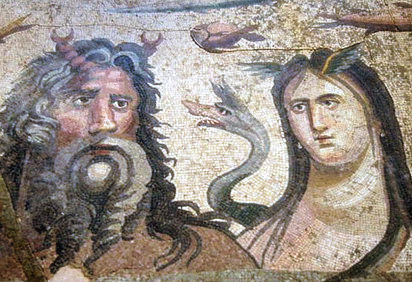Tethys: The Ocean Goddess of Greek Mythology
Tethys: The Ocean Goddess of Greek Mythology
Greek mythology is full of fascinating characters, gods and goddesses with unique and powerful abilities. One such deity is Tethys, the goddess of the ocean and one of the Titans. In this blog post, we will explore the life and legacy of Tethys, and examine her significance in Greek mythology.
 |
| Tethys |
The Life of Tethys
According to Greek mythology, Tethys was the daughter of Uranus and Gaia, and the sister of Cronus. She was married to her brother Oceanus, and together they had countless children, including the 3,000 river gods and the 3,000 ocean Nymphs known as the Oceanids.
Tethys was a powerful deity, and her domain encompassed all the waters of the world, including the seas, rivers, and fountains. She was often depicted riding a sea monster, and her symbols included dolphins and fish.
The Significance of Tethys
As the goddess of the ocean, Tethys played a vital role in Greek mythology. She was responsible for the wellbeing of all the aquatic creatures in the world, and was said to have the power to calm the seas and prevent storms. She was also a protector of sailors, and was often invoked in prayers for safe passage.
Tethys was not just a benevolent goddess, however. She was also known for her fierce temper and was not afraid to use her powers to punish those who disobeyed her. In one famous story, Tethys became angry with the god Hera and caused a drought that threatened to destroy the world. It was only when Hera apologized and made amends that Tethys relented and allowed the rains to return.
The Legacy of Tethys
Despite being a lesser-known figure in Greek mythology, Tethys has left an enduring legacy. Her name has been used to describe the oceanic ridge that runs through the Atlantic, Indian, and Pacific Oceans, and one of Saturn's moons is also named after her.
Tethys has also been referenced in numerous works of literature and art, from ancient Greek plays to modern-day paintings and sculptures. Her depiction riding a sea monster has become an iconic image in the world of mythology, and her role as the protector of the oceans continues to inspire and captivate people all over the world.
Story
Once upon a time, in the world of Greek mythology, the seas were in turmoil. Storms raged across the ocean, and ships were being dashed against the rocks. The creatures of the sea were afraid, and even the mighty Poseidon was unable to calm the waves.
In the midst of all this Chaos, Tethys appeared. Riding on the back of a sea monster, she approached Poseidon and demanded to know why he was unable to control the ocean. Poseidon, who was in awe of Tethys' power, explained that he had been unable to quell the storm because it had been summoned by the god Zeus, who was angry with the mortals on earth.
Tethys was furious. She knew that the mortals were innocent and did not deserve to suffer because of Zeus' anger. She decided to take matters into her own hands and set out to find Zeus.
When she found him, she confronted him and demanded that he put an end to the storm. Zeus, taken aback by Tethys' boldness, was about to strike her down with a bolt of lightning, but Tethys was not intimidated. She stood her ground and refused to back down until Zeus relented.
In the end, Zeus agreed to put an end to the storm, and Tethys returned to the sea, her power and authority firmly established. From that day on, the creatures of the ocean knew that Tethys was their protector, and they looked to her for guidance and safety in times of trouble.
Tethys's all children
Tethys was married to the Titan Oceanus, and together they had several children who were known as the Oceanids. The Oceanids were Nymphs who were responsible for the wellbeing of different aspects of the ocean, such as rivers, lakes, and fountains. Some of Tethys' children include:
These children were also the ancestors of various sea creatures and marine deities in Greek mythology.
Conclusion
Tethys was a fascinating and powerful character in Greek mythology, whose domain encompassed all the waters of the world. As the goddess of the ocean, she played a vital role in the lives of sailors and aquatic creatures, and was both a protector and a punisher. Her legacy continues to be felt today, and she remains an important figure in the world of mythology and beyond.










Comments
Post a Comment